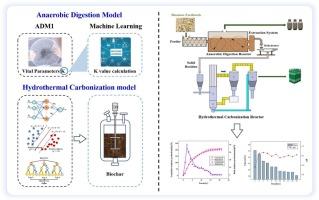Integration of anaerobic digestion and hydrothermal carbonization towards low carbon disposal and utilization: a simulation study
IF 7
2区 工程技术
Q1 ENERGY & FUELS
Sustainable Energy Technologies and Assessments
Pub Date : 2025-09-27
DOI:10.1016/j.seta.2025.104611
引用次数: 0
Abstract
This study developed an integrated model for anaerobic digestion-hydrothermal carbonization (AD-HTC) and incorporated carbon emissions to create a comprehensive evaluation indicator for AD-HTC technology. The model was constructed based on the machine learning and Anaerobic Digestion Model NO.1. The parameters of the overall integrated ecology were predicted, and optimal benefits were assessed. The results indicated that the accuracy of the integrated model exceeds 87.5%. Carbon emissions were calculated based on fertilizer substitution, biomass energy conversion, and hydrochar carbon sequestration. The carbon emission reduction value was described with the anaerobic digestion batch reaction time. The overall carbon emissions of AD-HTC exhibit a rapid increased from days 0 to 13, followed by a gradual decline from days 13 to 21. The peak carbon reduction of 1.092 gCO2eq occurred on day 13, which was 31.4–43.7% higher than that of AD/HTC alone. At present, the method proposed in this study was applicable for calculating the product end of AD-HTC reaction. The exploration of reaction equipment, suitability of feedstocks, and complex intermediate products will be further supplemented in the future. The findings of this study are expected to provide valuable insights for the scientific control and optimization of emerging AD-HTC technology.

厌氧消化与水热碳化相结合的低碳处理与利用:模拟研究
本研究建立厌氧消化-水热炭化(AD-HTC)一体化模型,并纳入碳排放量,建立AD-HTC技术综合评价指标。该模型是基于机器学习和厌氧消化模型NO.1构建的。对综合生态的各项参数进行了预测,并进行了最优效益评价。结果表明,综合模型的精度超过87.5%。碳排放量是根据肥料替代、生物质能源转换和碳氢化合物固碳计算的。用厌氧消化间歇反应时间描述了碳减排值。AD-HTC的总碳排放量从第0天到第13天快速增加,从第13天到第21天逐渐下降。第13天碳减排峰值为1.092 gCO2eq,比单独使用AD/HTC高31.4-43.7%。目前,本文提出的方法适用于AD-HTC反应产物端计算。对反应设备、原料适宜性、复杂中间产物的探索将在未来进一步补充。本研究结果有望为新兴AD-HTC技术的科学控制和优化提供有价值的见解。
本文章由计算机程序翻译,如有差异,请以英文原文为准。
求助全文
约1分钟内获得全文
求助全文
来源期刊

Sustainable Energy Technologies and Assessments
Energy-Renewable Energy, Sustainability and the Environment
CiteScore
12.70
自引率
12.50%
发文量
1091
期刊介绍:
Encouraging a transition to a sustainable energy future is imperative for our world. Technologies that enable this shift in various sectors like transportation, heating, and power systems are of utmost importance. Sustainable Energy Technologies and Assessments welcomes papers focusing on a range of aspects and levels of technological advancements in energy generation and utilization. The aim is to reduce the negative environmental impact associated with energy production and consumption, spanning from laboratory experiments to real-world applications in the commercial sector.
 求助内容:
求助内容: 应助结果提醒方式:
应助结果提醒方式:


